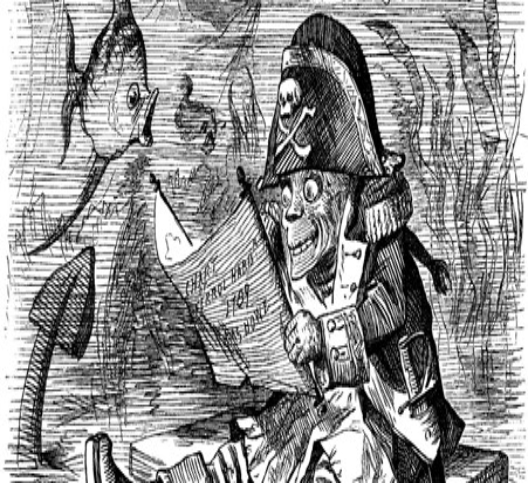(Note to ID readers: Below is chapter XI of my book, From Ordinary to Extraordinary – The Life and Times of Mattew Fontaine Maury, Pathfinder of the Seas. Hope y’all enjoy, and will perhaps share with your children. -T.M.)
The sickly old Commodore awakened from his extended and quiet respite. During the four long months of confinement to his bed, Lucy had not seen him look so rested as he appeared at this very moment. His complexion seemed less pale, his deep blue eyes nearly as clear as ever she could remember them from the days of her early childhood when she was just a pigtailed little girl. She bowed her head ever so slightly; closing her eyes and softly folding her hands together, she said a silent prayer, thanking her heavenly father for granting her beloved dad a few hours’ peace and rest.:
I thank thee, O God, for thy gracious blessing thou hast bestowed upon thy faithful servant, my poor old dying papa.
“He was a lovely boy,” suddenly announced the old Commodore. His eyes peered across the room as the words leapt from his lips. It was as though he were staring through the adjacent wall and off into the ether. “Who, papa?,” Lucy inquired slightly above the level of a whisper. “My wonderful ‘Davy Jones,'” answered the dying Commander.
Lucy was the youngest of the Maury children. As with all of her brothers and sisters, her father had given her a nickname when she was very little. All except the eldest, that is. When pressed for an explanation for the one exception, her father had always said that she had just grown up too fast before he had a chance to fix a proper name to her. Nevertheless, her seven younger siblings would all be given his or her own pet name by their father, each in his or her own turn. There was “Nannie Curly,” “Goggen,” “Davy Jones,” “Tots,” “Glum,” “Brave,” and “Sat Sing.” The last of which belonged, of course, to Lucy.
“He never said an unkind word to anyone,” the old Commodore continued speaking; “nor entertained an impure thought that I ever knew about.”
The boy’s baptismal name was John Herndon Maury. He took his middle name from his mother’s maiden name. Before the infant John Herndon grew to be a toddler, Matt would permanently affix to the lad a pet name of his own. He would call the lad “Davy Jones.”
“You know the old seaman’s tale of “Davy Jones’s Locker,” her father continued. “I gave to him the name because of the goodness of his little heart. He was always such a good and loving and obedient boy. Perfect in all his ways. He never questioned or disobeyed an order he was given by anyone in authority, but instead fulfilled it promptly, and with that cheerfully obedient disposition that always gladdens a father’s heart. The scriptures say that ‘a wise son maketh a glad father,’ and all can be assured that in this, as with all else that Book of books touches, the inerrant Word of God does not mislead or deceive.”
“Now, in the tale of ‘Davy Jones’s Locker,’ we are given to imagine that deep at the bottom of the vast ocean, there sits atop a large old wooden crate the spirit of an evil old sailor, eager to collect the flesh and bones of sailors, and all they have in the world, who should perish at sea by way of some disaster or other. Some versions of the tale give us to believe that the spirit of “Davy Jones,” ever restless and greedy of adding to the contents of his malevolent ‘locker,’ often rises from his abysmal perch to the surface to stir the elements into great squalls and tempests and storms, causing shipwrecks and great calamities at sea. Remember the words of Tobias Smollett in Adventures of a Peregrine Pickle? Says he:
This same Davy Jones, according to the sailors, is the fiend that presides over all the evil spirits of the deep, and is often seen in various shapes, perching among the rigging on the eve of hurricanes, ship wrecks, and other disasters to which sea-faring life is exposed, warning the devoted wretch of death and woe.

“I thought the name befitting the boy’s wonderful disposition because, I reasoned, such an agreeable temperament as was his possession was either that of a heavenly figure in human form, or proceeded from a sinister spirit deep within his soul, the angelic mask of which was donned to conceal.” The old Commodore chuckled at his own joke as he continued with his thoughts – “And since the notion of his having not inherited from his parents that sin nature passed down to us by our parents – and to them from theirs, and on and on back to our first parents – seemed to me unlikely in the extreme, I decided upon affixing to him a name more aligned with the rule of the case, and not of the impossible exception. There was also the matter of the possibility, I thought, that the ‘Davy Jones’ of legend and old seaman’s lore had undeservedly inherited a bad name for himself. If that be the case, then passing his namesake onto such a child as this would do its own small part to set the record straight. At least to the minds of the few who should come to know the latter.”
Lucy and her father both began to chuckle and laughed a few moments together at that. It had been a family joke for as long as she could remember. And her father had always possessed a very lively and imaginative sense of humor; one that people sometimes misunderstood since it proceeded from an uncommon original mind. Her father liked hearing a good joke as much as anyone else, and he liked telling one even more. But one thing he never permitted in his presence was gossip about other people, whether friend or foe, especially when effort was made to pass such gossip off as just another harmless joke. In any case, it did young Lucy’s heart good to see, if measured and but for a fleeting moment, return of her father’s wonderful sense of humor. She stole a moment to glance heavenward and to say another silent prayer of thanksgiving.
“If I could be granted one last request before the Lord calls me home,” the Commodore began again to speak, his demeanor suddenly turned serious, his voice now trembling slightly, “it would be to know what really happened to my wonderful ‘Davy Jones.'” Tears began to form in Lucy’s eyes. As with every other member of the Maury clan, Lucy knew that her unfortunate brother had suddenly disappeared early in the war while on a reconnaissance mission tracking the movements of the Union army. That was all anyone had ever known for sure, everything else surrounding his disappearance having always been shrouded in a veil of mystery. No one knew whether he’d been shot and killed, or drowned in the river near where he’d last been seen; or if perhaps he’d been captured and imprisoned by Union soldiers. The fact that nobody knew for certain what happened to John was a terrible burden for her father to bear, and Lucy knew it all too well.
When the young Maury failed to return to his outfit with his report on enemy positions by the next evening, his fellow junior officers became concerned for his well-being. Their commander organized a troupe of officers and enlisted men under orders to initiate a search-and-rescue mission for their missing comrade. They only knew where he’d last been seen and in what direction he had been headed. Beginning their search at that very place, they traced his movements the best they could until, at length, the company happened upon his riderless horse aimlessly wandering about near a narrow stream. Eventually they would follow the horse’s movements back to the spot where the evidence suggested the young Maury had dismounted. From that point they could only make out faint details of the events that followed.
In the moist terrain of that spot there were signs of a struggle involving several men, of which Lieutenant Maury must have been one. The others, it was surmised, must have been a small detachment of Union soldiers upon whose position young Maury had inadvertently ridden. The best scenario of what happened, the evidence seemed to suggest, was that Lieutenant Maury had dismounted from his horse to get a better look at the enemy position across the way through his field glasses. A small detachment of Union soldiers had seen him riding in their direction and had hidden themselves in a clump of trees nearby from whence they quickly planned an ambush. Suddenly and violently, they flung themselves upon and overwhelmed young Maury as he was dismounting. Upon their attack Lieutenant Maury’s horse was spooked and fled the scene in a panic. The evidence, such as it was, seemed to indicate the enemy soldiers got control of young Maury and dragged him down to the river where they had earlier crossed over in a small boat. From that, the assumption was made that his captors had conveyed the captured “prize” to the Union side of the river and back to their camp, where they were likely holding him prisoner. But that was just conjecture that no one knew for sure. Beyond those murky details, nothing was known whatsoever.
It was later learned that the regiment young Maury had been surveilling when he disappeared was under the command of General Grant. Lieutenant Maury’s father knew General Grant personally and well, as he did many other high ranking Union officers. And, indeed, young ‘Davy Jones’ himself was well known to many Union officers who had watched him grow from a boy to a man at the Observatory under his father’s superintendency for all those years before the war.
Upon learning of General Grant’s command of the army young Maury’s presumed captors must have been attached to, a Confederate messenger was dispatched, under the flag of truce, bearing a message from Lieutenant Maury’s father. The message informed General Grant of the circumstances of his son’s disappearance and last known whereabouts, and humbly requested his assistance in locating the younger Maury, or determining what had been his fate. General Grant promptly sent a heartfelt reply bearing his compliments to the elder Maury, expressing his deepest regrets and concerns for the young lieutenant’s safety and well being. He promised to expend every effort and to ‘leave no stone unturned’ in determining what had happened to Lieutenant Maury, and to dispatch the findings of his investigation back to the Confederate army at the earliest possible date.
Unfortunately, nothing ever came of General Grant’s investigation into Lieutenant Maury’s disappearance. No one under his command ever confessed to having been a member of the party that fell upon Lieutenant Maury on that fateful day. And to this very day the whole affair remains shrouded in a thick veil of darkness, as though it were forever locked away at the bottom of the sea in that old fiend’s crate sailing men call Davy Jones’s Locker.







Hopefully, he wasn’t captured by Yankees with the same disposition as those who captured Dewitt Smith Jobe.
I’m not familiar with Mr. Jobe’s story. Do tell.
I should imagine the Yankee disposition you allude to in any case is the same Yankee disposition that was manifest at the scapegoating “trial” and hanging of Captain Wirz, et al.
Here’s a link to a brief summary:
https://www.tennesseescv.org/dewitt-smith-jobe.html
He’s also one of the recipients of the Confederate Medal of Honor in Gregg Clemmer’s book. There’s also an SCV camp named in his honor.
Thank you for the link, sir. I will definitely take a look at it.